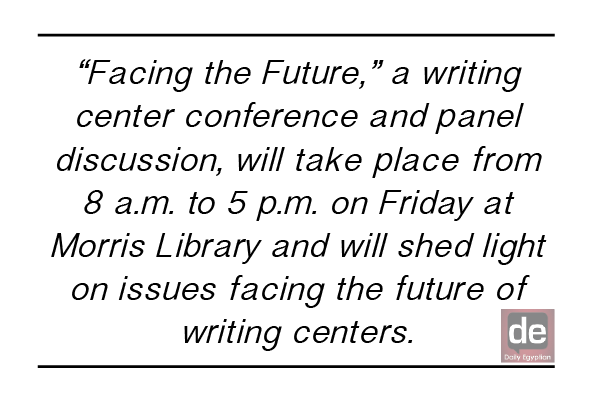Writing center conference prepares centers for the future

April 7, 2015
Some writers focus by themselves with the world moving around them, but others need a quiet, designated place where they can receive help and inspiration from their peers.
“Facing the Future,” a writing center conference and panel discussion, will take place from 8 a.m. to 5 p.m. on Friday at Morris Library and will shed light on issues facing the future of writing centers.
The writing center has been “helping writers in any and all disciplines develop their ability to express their ideas” for more than two decades, according to its mission statement.
Advertisement
Not only will center workers and students be attending, but also professors of various fields from 10 different colleges within the university. Registration for the event is free.
Jane Cogie, director of the writing center, along with a conference committee, organized the event focusing on the 21st century and increased diversity among students.
With cultures and technology progressing, new challenges emerge on campus worth discussing, especially regarding linguistics and writing.
“Writing centers need to evolve, just as all education needs to,” Cogie said. “Part of it is that we need to prepare students to be designers of social futures.”
She said to keep up with the 21st century, centers need to recognize growing diversity among students and avoid sticking to old solutions for new problems.
“We’re trying to have writing centers look towards reconceiving ourselves, not in terms of our mission of helping students write, but to see ways in which we can fold in the different constituencies that we’re working with,” she said.
Society’s technological advancement is crucial to grabbing students’ attention, she said.
Advertisement*
“In terms of designing social futures, you need to be able to design documents, weather it be online or not online, that go beyond just words,” she said.
Because Cogie did not grow up with social media as many students have, she said she is collaborating with them and brainstorming ways to match what is needed in changing times.
The collaboration does not stop at just SIU students and professors during the conference.
Along with representatives from 18 universities, as far away as Canada and Honduras, Dr. Carol Severino, a rhetoric professor and writing center director at the University of Iowa, will be giving the keynote speech.
Her speech will provide a survival guide for writing centers in the modern day, Cogie said.
Although adjustments need to be made, both students and tutors would say the writing center is doing better than ever.
When the writing center moved to Morris Library from Faner Hall in 2009, its popularity increased and cooperation between the center and library has been a contributing factor, she said.
“Libraries are involved, too, in the 21st century, where you’ve got more student services that relate to academics and they can work and see it as a place where they can collaborate with each other,” she said.
A common misconception is that writing center tutors are professors. In most cases, writers go to collaborate with students of the same caliber and sometimes the same age.
Students help organize the conference, which is sponsored by the Graduate Professional Student Council and is open to the public.
John Gund, a graduate student in rhetoric and composition from Carbondale, has been going to the center weekly to work on his thesis.
“It is incredibly helpful to have someone who is… in the same place as you,” he said. “They are working on similar papers, going through similar things and just to have that person who does not have the power of the grade over you provide their ideas.”
Jinseon Kim, a graduate student in linguistics from South Korea, is currently tutoring in the center and said she has recognized a dynamic between tutors and writers.
“Sometimes it’s hard to look at the faults and some things you can’t see while writing,” Seon said. “You just have a second set of eyes [when in the center].”
Although times are changing, the need for collaboration among students working toward a degree will remain constant.
“I don’t think [the writing center] is going to diminish any time soon,” Gund said.
Advertisement








